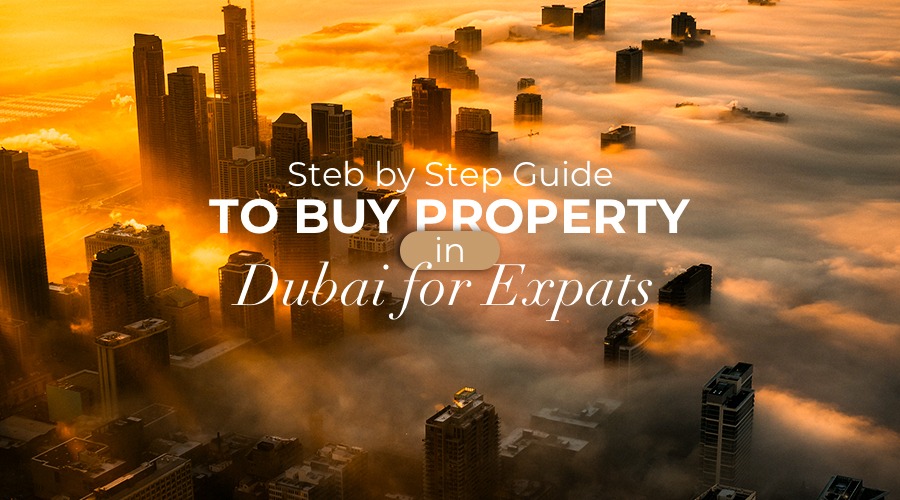Imagine waking up to the glimmering skyline of Dubai. With your morning coffee in hand, and the quiet knowing that the home you stand in is yours. Not rented. Not borrowed. Completely yours.
For expats living in this global city of ambition, buying property in Dubai isn’t just a dream; it’s a real, tangible opportunity. The rules have changed. The market has matured. And today, foreigners can own property in Dubai with full rights in designated freehold areas. And no, you don’t need to be a UAE national.
But here’s the thing: the process is meticulous, and missing a single step could cost you. This is why we put together this step-by-step guide to buying property in Dubai for expats. We’re going to walk you through every stage, clearly and confidently.
Whether you’re searching for a luxurious downtown apartment, a family villa, or a smart real estate investment in the UAE, this guide will answer all your burning questions.
Let’s dive in.
Can Expats Own Property in Dubai?
Yes, and not just as leaseholders, but as full-fledged property owners. The freehold ownership laws were introduced in 2002. And ever since then, expats can buy real estate in Dubai in specific areas approved by the government.
Where? It’s in hotspots like Downtown Dubai, Dubai Marina, Jumeirah Village Circle (JVC), Palm Jumeirah, and Business Bay. These places offer a great mixture of ROI and a luxurious lifestyle.
The Dubai Land Department (DLD) oversees all property transactions to ensure legal transparency and ownership security. Once your name is registered with the DLD and you receive your title deed, that property is 100% yours.
Think of it as Dubai saying: “Welcome. You belong here.”

Choose the Right Property Type: Off-Plan or Ready?
This is where it gets personal. Are you looking for a place to move into immediately, or are you planning for future returns? Ready properties in Dubai are ideal for those who want to move in now or earn rental income quickly. These homes are completed, and ownership is instant once payment and paperwork are done.
On the other hand, off-plan properties are those still under construction. They’re often cheaper and come with flexible payment plans. This is perfect for investors willing to wait and potentially gain higher capital appreciation. But be careful; you need to always buy from RERA-registered developers and verify the project’s approval status.
Set Your Budget
Now let’s talk money, and not just the sale price. Yes, property prices in Dubai are competitive compared to global cities. However, the real cost of buying property in Dubai includes more than the sticker price. Here’s what you’ll need to factor in:
- DLD registration fee: 4% of the purchase price
- Agency commission: ~2%
- Oqood fee (for off-plan): 4%
- Service charges (annual): Varies by community
- Mortgage registration fee (if applicable): 0.25% of loan value
Set a clear budget. Add a 7–8% buffer for fees, then proceed with power.

Work with a Trusted Real Estate Agent
Here’s a truth most expats learn too late: the right agent can save you months of confusion, legal trouble, and financial headaches.
Your criteria for a Dubai real estate agent: RERA-certified, experienced in working with expats, and has a solid reputation. Working with an agent will guide you to the right properties in Dubai freehold areas. But it doesn’t stop there; they also handle negotiations, coordinate with developers, and connect you with banks and legal advisors.
That’s where Richmond Properties comes in. We have real estate experience that is built on precision, trust, and tailored service. We’re more than just a brokerage, we’re your strategic partner in the Dubai property market.
Whether you’re an expat buying your first home or an investor exploring Dubai freehold areas, our experts walk you through every step with clarity, insight, and unwavering commitment. We know the neighborhoods. We understand the property laws in Dubai for foreigners. Most importantly, we listen because your vision deserves more than just a simple solution.
A great agent doesn’t just sell you property; they protect your peace of mind.
Apply for a Mortgage (If Needed)
Yes, expats can get a mortgage in Dubai, but only if they qualify. Most UAE banks offer mortgages for expats with a minimum 20% down payment if the property is under AED 5 million. It also requires proof of income, good credit, and sometimes residency. Interest rates usually depend on fixed or variable terms, so make sure you compare before you commit.
Pro tip: Get pre-approved before you even start viewing. It shows sellers you mean business and avoids heartbreak later.

Sign the Sale Agreement (MOU)
Once you’ve found your property and your offer is accepted, you’ll sign a Memorandum of Understanding (Form F). This agreement outlines the terms, payment plan, and responsibilities of each party. At this stage, you’ll also pay a 10% deposit, usually held by the agent or brokerage.
Make sure the MOU is crystal clear. No vague terms. No rushed decisions.
Finalize the Transfer at the Dubai Land Department
This is the moment it all becomes real.
Once financing is secured and all documents are prepared, both parties meet at the Dubai Land Department office to sign and transfer ownership. You pay the remaining balance, submit the DLD and admin fees, and receive your title deed.
Congratulations. You’re now the legal owner of property in one of the most exciting cities on Earth.

Final Thoughts: Why Now Is the Time
Buying property in Dubai as an expat isn’t just a transaction; it’s a statement. It’s a bold move that says: I’m not just living in this city. I’m investing in it.
With a transparent legal system, no property tax, high rental yields, and unmatched lifestyle perks, Dubai’s real estate market remains one of the most attractive globally. Whether you’re planting roots or chasing ROI, now is the time.
Because while other markets hesitate, Dubai is moving forward, with you in it.
Ready to Take the First Step?
Your future address is waiting. Whether you’re an expat dreaming of homeownership or a savvy investor looking for your next opportunity, buying property in Dubai is your gateway to a bigger life. Let it begin, step by step.
Reach out today, and let Richmond turn your Dubai property goals into a living reality. Because with the right partner, owning in Dubai isn’t just possible; it’s inevitable. Contact us now to schedule your free consultation.
FAQs
1. Can expats really own freehold property in Dubai?
Yes. Fully. No strings attached. Since 2002, expats have had the legal right to own property in designated freehold areas. That means you’re not leasing from the government or a landlord, you’re holding the title deed in your name, backed by the Dubai Land Department. This is real ownership, in every sense of the word.
2. What are the best areas in Dubai for expats to buy property?
If lifestyle and returns matter to you (and they should), look at hotspots like Downtown Dubai, Dubai Marina, Palm Jumeirah, Business Bay, and JVC. These areas aren’t just popular, they’re high-performing. Think waterfront views, urban convenience, and communities built for global citizens.
3. Is it better to buy off-plan or ready property?
It depends on your timeline and goals. Want to move in or rent out immediately? Go ready. Want long-term gains and flexible payment plans? Consider off-plan. Just make sure the developer is RERA-approved. Dubai rewards the strategic, not the impulsive.
4. How much money do I really need to buy a property in Dubai?
More than the listing price. Budget for 7–8% extra to cover the DLD fee (4%), agency commission (~2%), service charges, mortgage fees (if any), and other admin costs. Plan smart, spend with purpose, and don’t let hidden costs catch you off guard.
5. Can expats get mortgages in Dubai?
Yes, if you meet the criteria. Most banks offer up to 80% financing for expats, but you’ll need a clean financial record, proof of income, and a 20% down payment. Pro tip: get pre-approved. It gives you negotiating power and peace of mind.
6. Do I need to live in Dubai to buy property here?
No, residency is not required to buy property in Dubai. But if you’re planning to finance your purchase with a mortgage, being a resident can help with eligibility and loan terms. Either way, you can buy remotely or on the ground with the right advisor by your side.
7. What legal documents do I need to complete a property purchase?
You’ll need your passport, Emirates ID (if resident), proof of funds or mortgage pre-approval, and a signed Memorandum of Understanding (MOU). Once all documents are ready, you’ll complete the transfer at the Dubai Land Department and receive your title deed.
8. How long does the buying process take from start to finish?
If you’re buying a ready property with cash, you could be a homeowner in 2–4 weeks. Mortgages or off-plan deals may take longer depending on approvals and construction timelines. The key to speed? Preparation and the right team behind you.
9. Are there any taxes on property in Dubai?
Zero property tax. Zero capital gains tax. The only recurring cost is your annual service charge. Dubai’s real estate market isn’t just appealing, it’s financially liberating.
10. Why should I use a real estate agent instead of going solo?
Because this isn’t guesswork, it’s a high-stakes transaction. A certified, expat-savvy agent protects you from legal missteps, pricing traps, and dead-end deals. At Richmond, we don’t just find you a property, we secure your future.

